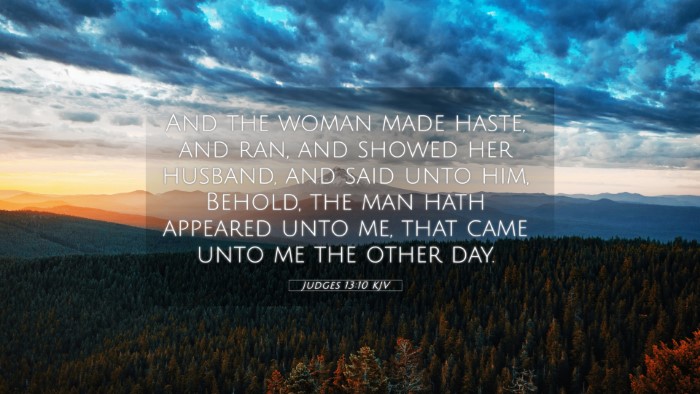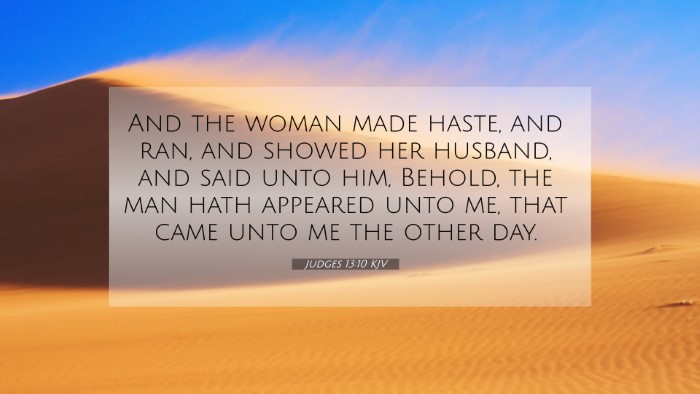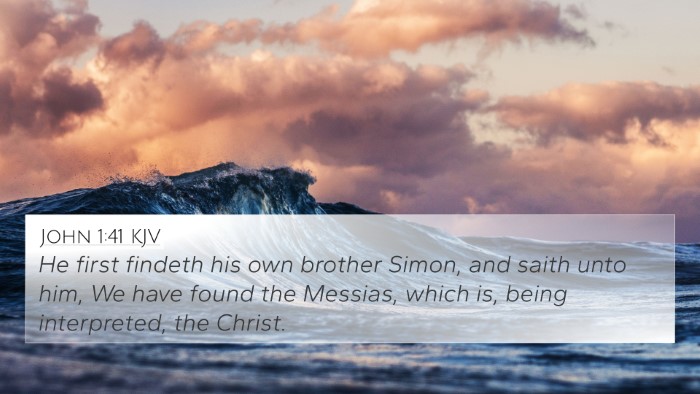Understanding Judges 13:10
Judges 13:10 states: "And the woman ran and told her husband, saying, A man of God came unto me, and his countenance was like the countenance of an angel of God, very terrible: but I asked him not whence he was, neither told he me his name."
Overall Summary
This verse highlights the encounter of Manoah's wife with a divine messenger, underscoring the theme of God's active presence in human affairs and the importance of divine guidance in the establishment of significant characters in Biblical narratives.
Commentary Insights
-
Matthew Henry's Commentary:
Matthew Henry emphasizes the spiritual importance of this encounter. He points out that God often uses angels to deliver messages to His chosen servants, illustrating the reverence and awe that accompany divine revelations. The woman's reaction highlights her awareness of the holiness associated with such visitors.
-
Albert Barnes' Notes:
Barnes notes the significance of Manoah's wife's experience and stresses the clarity and power with which the angel presented himself. He interprets the 'terrible' countenance as an indication of God's holiness and the seriousness of the message being conveyed, reflecting the reverence due to God’s messengers.
-
Adam Clarke's Commentary:
Clarke offers insights into the character of the angel as a protector and guide to Israel. He explains the context of Israel’s oppression and how this divine interaction signifies God's intervention. Clarke elaborates on the implications of receiving divine messages, connecting it with the themes of obedience and faith.
Thematic Connections
This verse serves as a foundational moment for the narrative of Samson, linking it to broader themes of divine intervention and the birth of significant national leaders. It resonates with other biblical events where God appoints individuals for His purposes.
- Connection to Exodus 3:2-6: God's messenger appears to Moses in the burning bush, indicating a similar divine encounter.
- Connection to 1 Samuel 9:15-17: God sends Samuel to invite Saul, highlighting God's guidance in choosing leaders.
- Connection to Isaiah 6:1-8: Isaiah’s calling demonstrates a similar awe-filled encounter with a divine being.
- Connection to Luke 1:26-38: The announcement of Jesus’ birth by the angel Gabriel draws parallels to divine messages sent to ordinary individuals.
- Connection to Matthew 1:20-21: Another angelic message regarding Jesus emphasizes how God communicates through messengers.
- Connection to Daniel 9:21-23: An angel delivers a significant message to Daniel, reflecting God's continuous guidance through His angels.
- Connection to Revelation 22:8-9: The apostle John’s encounters with angels parallels the divine communication seen in Judges 13.
Cross-Referencing Biblical Texts
In exploring Judges 13:10, we can utilize tools for cross-referencing to deepen understanding of both the text and its implications:
- How to find cross-references in the Bible: Utilizing a Bible concordance can guide readers to similar passages that share themes or concepts.
- Bible Cross-reference guide: Such guides can illustrate connections within the biblical text, revealing how stories and messages relate to each other.
- Cross-reference Bible study: This method encourages thematic studies across different books, enhancing the understanding of God's unified message.
- Identifying connections between Old and New Testament: Exploring how this event foreshadows the New Testament and its fulfillment in Christ presents an important thematic study.
Concluding Thoughts
Judges 13:10 serves not only as historical narrative but also as a theological anchor demonstrating God's continuing engagement with humanity. It sets the stage for the story of Samson, highlighting themes of divine purpose and preparatory actions taken by God to fulfill His promises to Israel.




